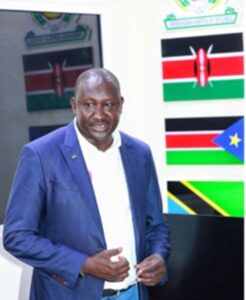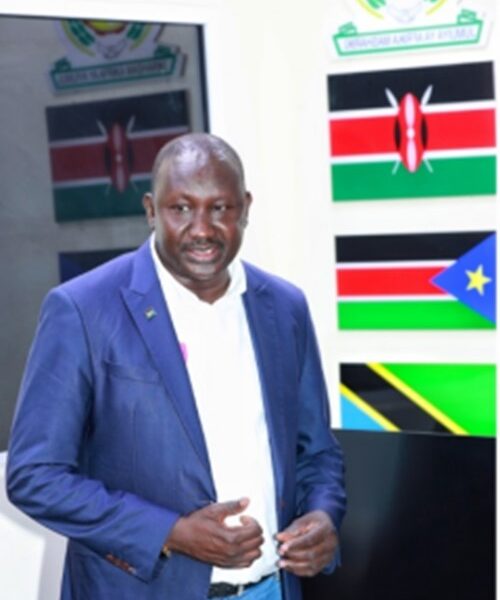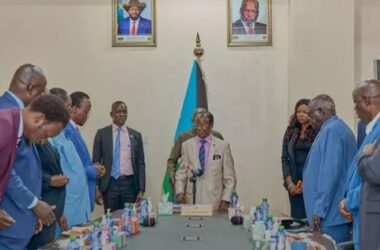
Emmanuel Kachoul, Chairperson of the South Sudan Freight Association and Business Community
By Lodu William Odiya
South Sudan Freight Forwarders Association and the business community are urging the South Sudan government to reconsider its cargo handling strategy at the Port of Mombasa.
The forwarders were calling on the Ministry of Transport to reinstate a previous directive that allowed South Sudan cargo to be consolidated at two designated Container Freight Stations (CFS): Auto-port and Compact Freight Systems.
This appeal comes after a Kenyan court’s decision to bar Auto-port company from handling and processing goods destined for South Sudan.
Emmanuel Kachoul, Chairperson of the South Sudan Freight Association and Business Community in Mombasa, emphasized that Panda Freight and Logistics was the sole agent appointed by the gov’t of South Sudan to manage the handling and clearance of South Sudan-bound cargo.
In a letter addressed to Minister of Transport, Dr. Lam Akol, Minister of Finance Dr. Marial Dongrin, and Minister of Trade Atong Kuol Manyang, Mr. Kachoul stated that Panda was the pioneer of South Sudan Transit Cargo handling and monitoring projects at the port of Mombasa.
In light of the above,” we were advising by our parent government to work hand in hand exclusively with Auto-port and Compact Freight Terminals to consolidate South Sudanese cargo to effectively fulfill their mandate necessary obligations as required by the South Sudan Government”, a fact that had been deliberated and brought to the attention of the Kenya government effectively.
“This decision was made to enhance control, streamline monitoring, and ensure a seamless clearance process. These objectives can never be achievable if the cargo were dispersed among the 22 available Freight Terminals in Mombasa,” he said.
Kachoul added in the letter that “At no point have the designated terminals undertaken transportation of cargo. This responsibility lies with the importers and their appointed transporters.”
The court, he said, unfortunately, didn’t distinguish the unique roles played by Container freight Stations (CFS) or terminals, mistaking them for clearing agents or transporters, which they are not.
It is noteworthy mentioning that CFS don’t get involved in auctioning of any Transit cargo. It is the sole responsibility of customs.
The Freight Forwarders Association leader reiterated that this consolidation is critical for enhancing control, improving monitoring, and streamlining clearance processes.
“We respectfully request the Ministry of Transport to reconsider and reaffirm the earlier directive dated November 9, Ref: RSS/MO/MOTJ/27/4, allowing for the consolidation of South Sudanese cargo at only two Container Freight Stations: Auto-port and Compact,” he stated in the letter.
“This arrangement would be particularly beneficial among other benefits for the safe, secure and cost-effective storage of dangerous goods (Classes 1-9), which should not remain in the port area for extended periods. It’s important to note that our nation’s security concerns are easily checked and ensured from this point.”
The Forwarders emphasized that managing cargo across 22 different freight terminals complicated efficient handling, thereby affecting trade and safety, especially for hazardous goods.
He asserted that consolidating cargo at two terminals would not only improve efficiency but also ease the workload on South Sudan Revenue Authority (SSRA) customs officers stationed at Mombasa port.
The association further called on SSRA Leadership to establish South Sudan owned Freight Stations and Empty Container Depots at all ports of inbound and outbound to ensure permanent solution for handling South Sudan-bound cargo.
The association acknowledged the efforts of cargo stakeholders in Mombasa and stressed the need to adhere to legal requirements for clearing agents operating at the port.
The letter is co-addressed to ministers, Dr. Marial Dorin and Atong Kuol Mangany of Finance and Trade, respectively. It is copied to Simon Akuei, Commissioner General Revenue Authority (RSS).
Justin Morana Head of Delegation to recent Mombasa fact-finding mission, Lado Lukak, chairman of RSS Chamber of Commerce and Deng Ayuen, national chairman of RSS Freight and Forwarding Association.
On July 19, 2025, the Kenyan High Court halted the transportation and management of South Sudan’s cargo by Auto-port, a company linked to the family of Cabinet Secretary Hassan Joho.
Justice Christopher Ndolo Mutuku issued the order after finding that the company had failed to effectively execute its mandate in handling and processing cargo destined for South Sudan.
The then Minister of Transport, Madut Biar Yel, wrote to his Kenya counterpart Kipchumba Murkomen, current Interior Cabinet Secretary, outlining operation of cargoes at the port of Mombasa.
The letter said in part “Hon CS, as you are aware goods to South Sudan are extremely sensitive and therefore closely monitored by our customs officers stationed at the port of Mombasa and the two mentioned CFS’s, our understanding is that our custom officers can be overstretched if our cargo is handled in more than two facilities. This could create diversion of cargo and loss of revenue and even security gaps.”
The cargo handling crisis arose despite a high-level delegation’s visit on June 26, 2025, to Mombasa, led by Justin Marona from the National Transitional Assembly, aimed at identifying and addressing persistent issues hampering the movement of South Sudanese cargo.
Notable members included Chabur Goc and Akec Tong from the South Sudan Revenue Authority, all focused on finding actionable solutions.
The South Sudanese business community remained optimistic, urging all parties involved in cargo clearance to work collaboratively to foster sustainable business growth in the region.
For now, all eyes will be focused on the Ministry of Transport and all stakeholders in the business for their responses to the requests from the freight forwarding association.




